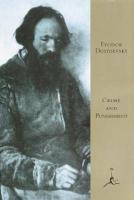
Fyodor Dostoevsky’s Crime and Punishment is widely praised in literature for its deep exploration of despair and existential dread. The novel follows Rodion Raskolnikov, a former student living in St. Petersburg, who is utterly struck by poverty and existential torment. Early in the narrative, Raskolnikov murders with the belief he is acting for the greater good. Dostoevsky later reveals Raskolnikov's initial justification: certain "extraordinary" individuals, shown by figures like Napoleon Bonaparte, are above the moral and legal constraints that govern ordinary people. Raskolnikov believes these individuals have a duty to take extreme actions, such as murder, to advance society. Throughout the novel, Raskolnikov convinces himself he belongs to this exceptional category. However, the act leads him into a severe psychological breakdown.
Despite the novel's esteemed reputation, my experience with Crime and Punishment was disappointing. I found the dialogue unrealistic and excessively repetitive. As an avid reader, I often remain patient when diving into the first 100 pages of a book, but the entire 600 pages of this book were a struggle. I persistently sought the profound substance that many readers praise but ultimately found it elusive. Now, after having finished and reflected, I still can’t seem to find it.
I’m aware Nietzche considered Dostoevsky “ [ the] only psychologist [he] had anything to learn from.”, and now I don’t know how accurate that statement is. Previously, I had appreciated Dostoevsky's insights, particularly in works like Notes from the Underground and his other short stories. However, Crime and Punishment left me questioning the nature of Nietzsche's statement. Suddenly, Dostoevsky's writing became almost insufferable to me—a thought that may seem superficial but accounts for my honest opinion. It prompted a series of questions: Who are these characters he presents to the reader? Are they fragments of his personality or depictions of those he despises? I remain uncertain. What I do know is that while Raskolnikov endured his existential crisis, I felt like I was going insane reading the book. Is this truly what an existential crisis looks like? Constant mood swings, physical sickness, and pretentiousness? Maybe. Yet, I find it hard to believe.
The novel contains numerous useless passages and scenes. Acknowledging the context that Russian authors were historically paid by the page and not the quality of their work, the abundance of words is understandable. However, were all those scenes necessary? The sole scene that somewhat captivated me was the tragic death of Katerina Ivanovna. Though that appears cynical, it was one of the only scenes charged with emotional intensity and action. Her body passionately and desperately carried into a stranger's house, the frantic cries of Sonya, the futile clinging of the children, and the dramatic fervor of Katerina's final declarations… Is it that ridiculous I enjoyed that scene? Listen, I’ve read numerous novels centered around a single protagonist and their world, and I've enjoyed many of them. So don't mistake my review for a bias against character-focused narratives; in fact, I often adore them. I am particularly drawn to darker books that delve into the psychological aspects of their characters. While many readers praise the psychological depth of Crime and Punishment, I find it lacking. The novel barely explores the “ingenious” mental intricacies it is famed for. Instead, it presents Raskolnikov as a arrogant man who sees himself as morally and intellectually superior—a trait that I, and many others, find insufferable
Now the names…The multiple names drove me insane. Differentiating between Raskolnikov and Razumikhin was a constant challenge. Despite their distinct personalities, their names are strikingly similar. Further complicating matters, Raskolnikov is also referred to as Rodion Romanovich or Romanych. His sister, Dunya, alternates between Dunechka and Avdotya Romanovna. Razumikhin is likewise known as Dmitry Prokofich or Vrazumikhin, and Dunya's fiancé, Petr Petrovich, is also called Luzhin. The endless use of interchangeable names was confusing and added nothing to the narrative's message. However, I might be missing an important component of Russian culture.
Overall, I found Crime and Punishment to be an exaggerated portrayal of human emotions. The novel struck me as false, monotonous, dull, and excessively drawn out. I approached it with high expectations but was ultimately left disappointed. Thus, I rate it two stars.
